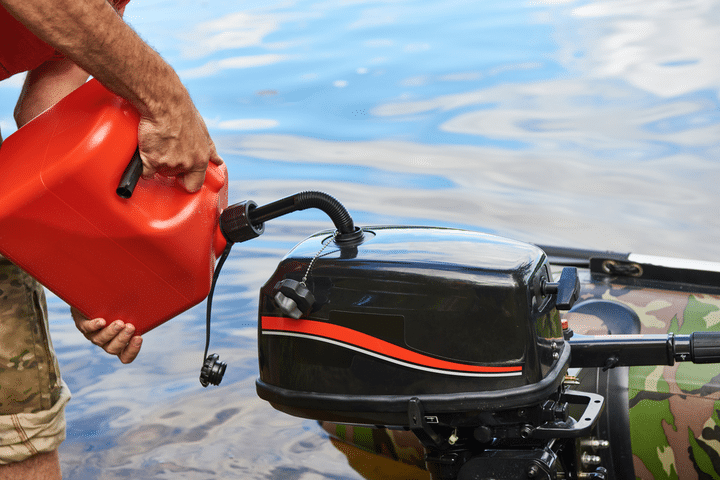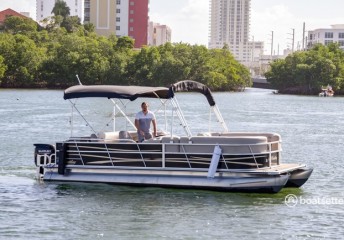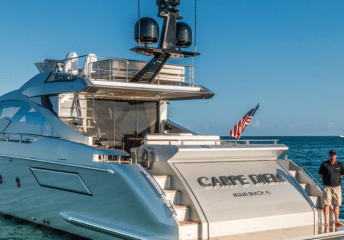Boat Fuel 101: The Complete Guide to Boat Fuel Types
Last Updated on December 20, 2022 by Boatsetter Team
When you rent a boat or buy one for the first time, you might have a lot to learn about the boating lifestyle and what kind of fuel to use. It may not be immediately clear what type of fuel or engine oil you will need for your boat. Sometimes you will have to choose between various ethanol levels. You might have to mix oil with your fuel or even deal with diesel fuel on some occasions. The type of fuel you use in your boat has a huge impact on the performance and overall enjoyment you have with your boat.
There is plenty of debate over what type of fuel an outboard motor should use. Fueling your boat with ethanol-free gasoline not only protects the condition of your boat engine, but it also extends the life of your engine.
A lot of fuel choices come down to your type of motor. Small boats and pontoons usually run on gasoline and ethanol, but larger boats may require diesel. Others may require any one of the three, depending on your motor, size, and type of boat. If you need help deciding what type of fuel to put in your boat, this guide should give you a good starting point.
Type of Fuel: E10
Running E10 (a fancy way of saying ten-percent ethanol) is a good way to give your boat what it needs. This type of fuel should be compatible with any engines created in the last ten years or so. Ethanol was introduced into fuel as a way of reducing pollution. This high-grain alcohol may not be ideal, but it does help to lower hydrocarbon emissions.
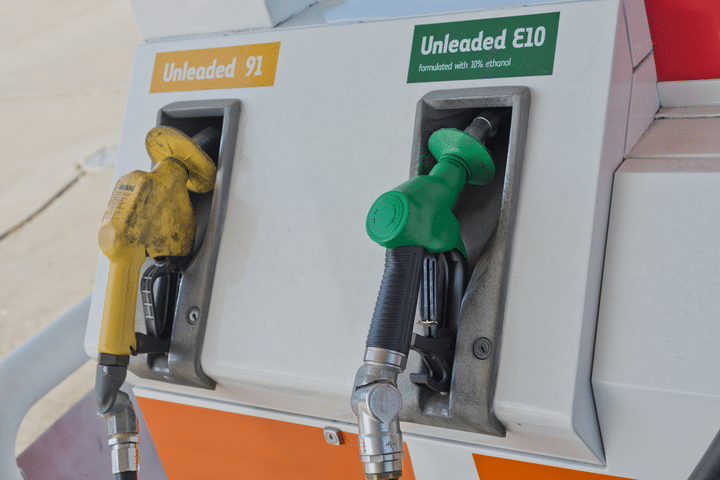
In low quantities, it can certainly be beneficial to run E10 fuel in your small personal boat. You can run your boat off of E10 fuel to save costs, but there could be some long-term implications for doing so. Ethanol is well-known for being a solvent that can quickly corrode rubber and fiberglass. It can also loosen debris that might be in your fuel and lead to a clogged fuel line. Only fill up with the amount you need to help avoid some of these negative side effects of using E10 in your boat.
As you can imagine, ethanol can do some serious boat damage over time. It can puncture a hole in the fuel tank or even break down a strong fiberglass frame. Also, ethanol sometimes attracts water. Experts usually recommend draining the ethanol-gasoline from your tank if a boat is docked for more than ninety days.
Type of Fuel: E15
There are also some pressing questions when you combine gasoline with ethanol levels higher than ten percent. E15 fuel refers to fifteen percent ethanol and eighty-five percent gasoline. However, the National Marine Manufacturers Association has cautioned against using E15, because not only can it damage your engine, but it can also be bad for the environment. The Department of Energy’s National Renewable Energy Laboratory found that E15 caused boats to exceed current EPA emission standards.
Some outboard motors may specify a different type of fuel. Make sure to check the owner’s manual for the specifics regarding your outboard engine. When given a choice at the pump, ethanol-free is ideal, but E10 will also work. Ensure that you only use pumps that are clearly labeled with their fuel types.
Making a choice for Outboard Motors
The best gas for outboard motors always depends on the specific make and model of your motor. Identify the manufacturer’s specific instructions in the owner’s manual before making a final decision about what fuel to use. Most outboard motors will run on E10 gasoline, but they can sometimes cause corrosion in the fuel tank and eat through fiberglass finishes on the boat.
There are also some diesel outboard motors. These tend to be more powerful and use less diesel compared to how quickly you may burn through E10 gasoline. A diesel motor can be a more efficient choice for many boaters, especially if you intend to cover long distances and carry heavy loads on the boat.
Larger boats will almost always come with diesel motors. They require the extra horsepower and torque from a diesel motor to run smoothly through the water. Remember that diesel tends to be more expensive both in terms of the motor and the fuel itself. It also makes your motor louder, which might detract from your overall boating experience. However, according to some experts, diesel has roughly ten percent more energy potential than gasoline because the engine runs more efficiently. So it may help to balance out the price difference between diesel and other gasoline types at the pump.
Adding Oil to the Fuel
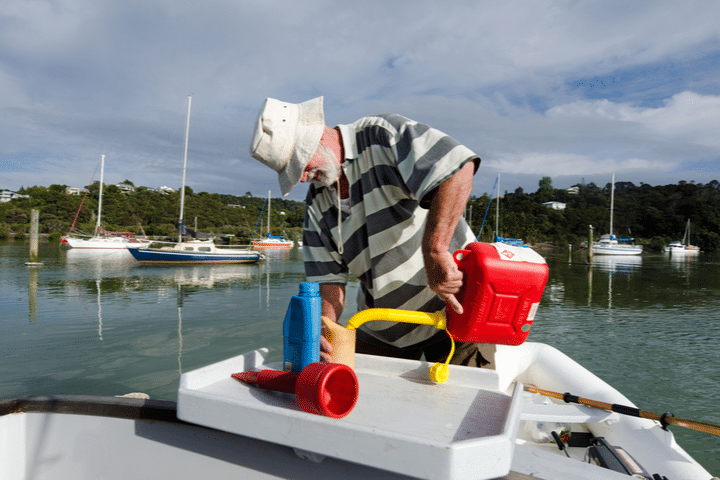
Some older two-stroke outboard motors may require you to mix fuel and oil. They often have a smaller tank for you to pour two-stroke oil into. Some people prefer to blend their own fuel, but finding the right ratio of oil to fuel can be challenging, and it can lead to serious consequences, like a smoking motor that coughs and sputters. You could even do some major internal damage to the motor if you are not careful enough.
Trying to calculate the total amounts at the pump can slow you down, so many people prefer to mix their oil with gasoline beforehand. Some motors will require a 25:1 ratio for a specific length of time, but the two-stroke engines found in most new personal boats require a 50:1 ratio. If you are trying to figure out the proper amounts for an older used boat, always check the owner’s manual for specific recommendations.
Pontoon Boats
There is a wide variety of pontoon boats available, so it always helps to know what your make and model recommends. Most pontoons have a small outboard motor to propel them through the water. The larger the pontoon is, the more powerful this outboard motor. Usually, pontoon boats can be operated with the same unleaded fuel you use in your car.
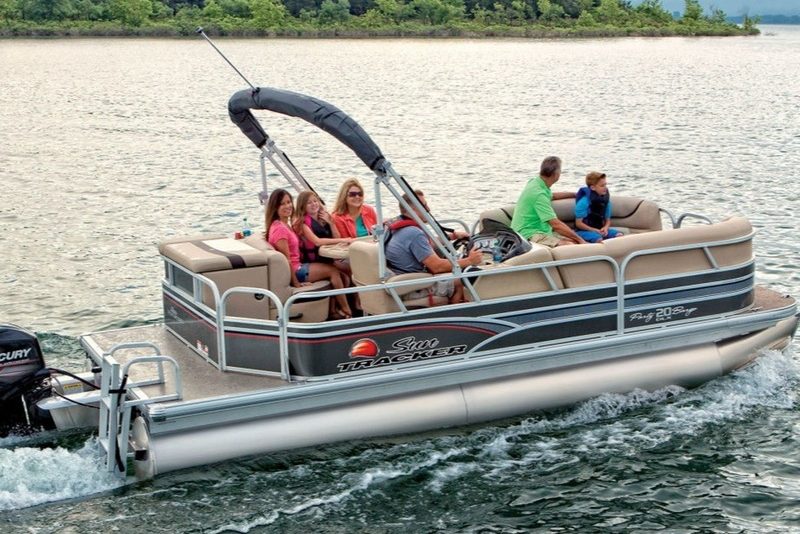
Keep the ethanol content of the fuel in mind when you are filling up your pontoon boat. E10 is the maximum amount of ethanol to use on a pontoon.
If you rent or buy an older pontoon, it may come with a two-stroke outboard motor. It might require a little bit of extra work to add two-stroke injection oil into a separate tank. The specific ratios of oil to gasoline will vary, but as explained above, most people estimate that you should have them in a 50:1 ratio. A newer motor may require double that ratio at 25:1.
Final Reminders
You will probably find a lot of conflicting information about what might be best for the boat you rent or purchase. Small boats, pontoons, and larger boats may all require different types of fuel and oil. Understanding what each one requires is an important part of becoming an informed boater.
If you are not quite ready to take on the responsibilities of fueling your boat yet, we offer the option of having a licensed captain aboard. This means having an expert on the boat. If you have any questions about the type of fuel, you should be using on the boat and where to get it, you can have complete confidence in the boat captain to handle the situation professionally.

Boatsetter empowers people to explore with confidence by showing them a world of possibility on the water. Rent a boat, list your boat, or become a Boatsetter captain today.
